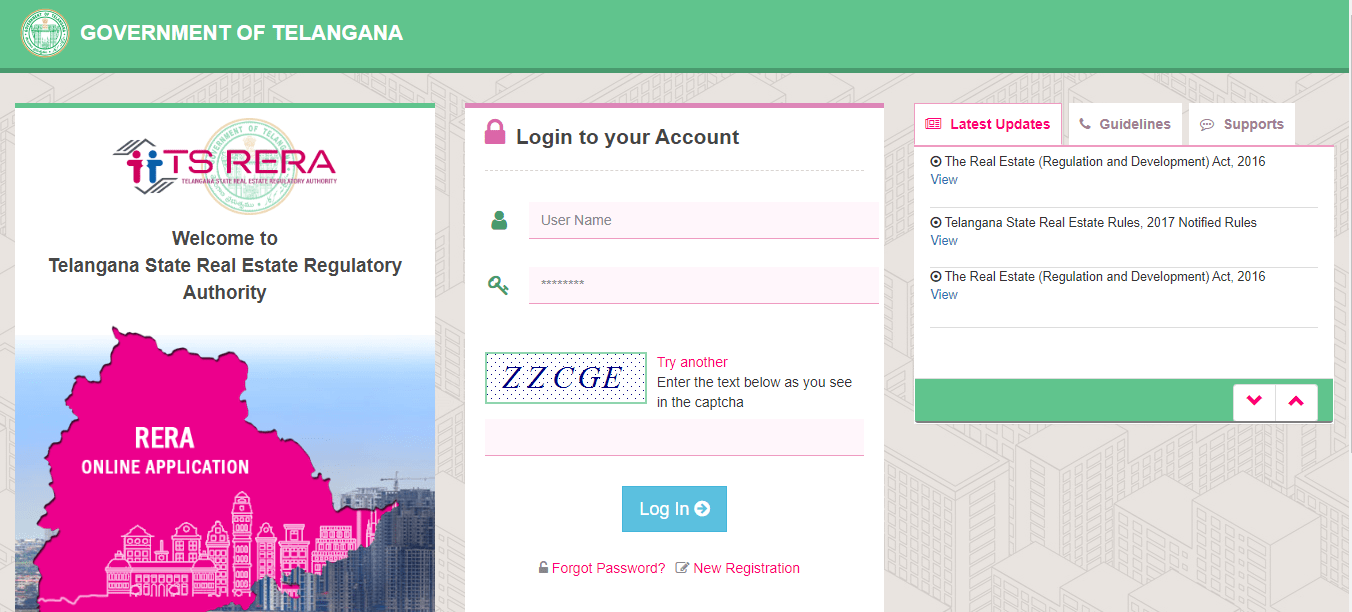Introduction to RERA Telangana
The Real Estate (Regulation and Development) Act, 2016 (RERA) aims to enhance transparency and accountability in the real estate sector. RERA Telangana, established under this act, governs all real estate transactions within the state. Understanding the RERA registration process, fees, and charges is crucial for developers and buyers alike.
RERA Telangana Registration Process
Step-by-Step Guide for Developers
- Visit the Official RERA Telangana Website: Access the registration portal at RERA Telangana.
- Please create an account: Developers must register an account using their email ID and phone number.
- Login to the Portal: Use the credentials provided during account creation to log in.
- Fill out the registration form. Provide detailed information about the project, including location, size, type, and timeline.
- Upload Required Documents: Documents such as land title, encumbrance certificate, sanctioned plan, layout approval, and financial statements are essential.
- Pay the Registration Fees: Fees vary based on project type and size. Payment can be made online via net banking, credit/debit card, or UPI.
- Submit the Application: Review all details carefully before submitting. An acknowledgement receipt will be generated upon successful submission.
- Track Application Status: Use the application number to track the status of your registration on the portal.
Step-by-Step Guide for Agents
- Access the RERA Telangana Portal: Visit RERA Telangana and navigate to the agent registration section.
- Create an Agent Account: Register using a valid email ID and phone number.
- Login and Fill the Form: Enter details such as name, contact information, and agency details.
- Upload Necessary Documents: Required documents include identity proof, address proof, and business registration certificates.
- Pay the Registration Fees: Agents are required to pay a nominal registration fee.
- Submit and Track Application: Submit the form and keep track of the application status using the provided tracking number.
Fees under RERA Telangana
Registration Fees for Developers
- Residential Projects:
- For projects with a total area of up to 500 sq. meters: ₹10 per sq. meter
- For projects with a total area above 500 sq. meters: ₹15 per sq. meter
- Commercial Projects:
- For projects with a total area of up to 500 sq. meters: ₹20 per sq. meter
- For projects with a total area above 500 sq. meters: ₹25 per sq. meter
Registration Fees for Agents
- Individual Agents: ₹10,000
- Other than Individuals (e.g., Firms): ₹50,000
Renewal Fees
- Developers: 50% of the original registration fee
- Agents: ₹5,000 for individuals and ₹25,000 for firms
RERA registered Projects in Hyderabad ▶ CLICK HERE
Documents Required for RERA Registration
For Developers
- Land Title Document: Proof of ownership or development rights.
- Encumbrance Certificate: Confirms that the property is free from legal or monetary liabilities.
- Sanctioned Plan and Layout Approval: Approved by the local planning authority.
- Project Financial Details: Includes estimated cost, funding sources, and expenditure plan.
- Project Brochure: A detailed brochure including specifications, amenities, and layout plans.
For Agents
- Identity Proof: Aadhaar card, PAN card, or passport.
- Address Proof: Utility bills, rental agreement, or property tax receipt.
- Business Registration Document: Certificate of incorporation for firms.
- Photographs: Recent passport-size photographs.
Penalties for Non-Compliance
RERA Telangana imposes strict penalties for non-compliance. Developers and agents who fail to register their projects or agencies can face penalties of up to 10% of the project cost. Continued non-compliance may lead to imprisonment for up to three years or additional fines.
Benefits of RERA Telangana
For Buyers
- Transparency: access to all project details, including approvals and progress.
- Timely Completion: Assurance of timely delivery of projects.
- Grievance Redressal: A dedicated mechanism for addressing complaints and disputes.
For Developers
- Credibility: Enhanced reputation and trust among buyers.
- Structured Process: Streamlined process for project approvals and registrations.
- Legal Protection: Legal safeguards against false claims and disputes.
For Agents
- Professional Recognition: Increased trust and credibility among clients.
- Market Opportunities: Better market access and growth opportunities.
- Regulatory Framework: Clear guidelines and procedures for real estate transactions.
Conclusion
RERA Telangana has revolutionized the real estate sector in the state by ensuring transparency, accountability, and efficiency. By understanding and adhering to the registration process, fees, and charges, stakeholders can ensure compliance and benefit from the numerous advantages offered by RERA Telangana.
Frequently Asked Questions
1. What is RERA Telangana?
RERA Telangana is a regulatory body established under the Real Estate (Regulation and Development) Act, of 2016. It aims to bring transparency, accountability, and efficiency to the real estate sector in Telangana.
2. Why is RERA registration important for real estate projects?
RERA registration ensures that real estate projects comply with legal standards, providing protection to buyers and enhancing the credibility of developers. It mandates transparency and accountability in project execution.
3. Who needs to register under RERA Telangana?
All real estate developers and agents involved in the sale of properties must register with RERA Telangana. This includes residential, commercial, and plotted development projects.
4. How do I register my real estate project with RERA Telangana?
Developers can register their projects by visiting the RERA Telangana website, creating an account, filling out the registration form, uploading necessary documents, paying the registration fees, and submitting the application online.
5. What documents are required for RERA registration for developers?
Key documents include:
- Land title document
- Encumbrance certificate
- Sanctioned plan and layout approval
- Project financial details
- Project brochure






